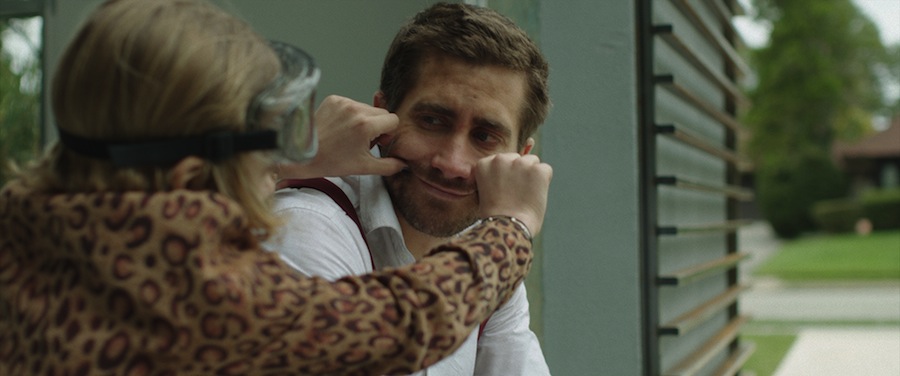‘Demolition’ Grief isn’t the easiest emotion to film, which is to say it’s an emotion prone to cliches: people standing silently before gravestones, group hugs, survivors suddenly breaking down into crying jags, sad staring at random objects that hold obscure significance. Death is a private event, but in movies everyone tends to brood the same way. “Demolition,” to its credit, includes almost none of these. Its hero, Jake Gyllenhaal’s Davis Mitchell, uses his wife’s accidental death in a car crash to rage hard at the button-down, moneyed life the two had painstakingly created. He doesn’t have the patience — or, seemingly, the capacity — for tears, and we might even think, as certain characters do, that he’s not really human. RELATED: What it’s like to watch “Batman v Superman” in a 4DX theater There’s a reason for that. “Demolition” succumbs to a different cliche: the grief movie as quirk-a-thon. Gyllenhaal’s Davis spends the initial fallout firing off angry handwritten letters, much like Ben Stiller in “Greenberg” — in fact, exactly like Ben Stiller in “Greenberg.” The only difference is Davis actually gets a response. Suddenly he’s first a pen pal then hanging in person with Karen (Naomi Watts), a consumer service drone at a vending machine company whose wares sometimes get stuck in the coils. (Don’t you hate when that happens?) We may be trained to detect a romantic spark between them, but the script throws a decent curveball. Instead Davis winds up spending more time with her teenage son, Chris (Judah Lewis), a wild-haired, pint-sized destructo who suspects he might be gay. As Davis grouchily inspires Chris to be himself, Chris teaches the already snippy Davis to further unlock his id, which he translates into eccentrically (and symbolically!) taking apart all of his appliances and gradually turning his tony suburban manse into a disaster zone. That “Demolition” isn’t always as annoying and Psych 101 as this makes it sound is a credit to Gyllenhaal’s hilarious work and direction, by Jean-Marc Valee, that periodically betrays a decent ambitious streak. Once typecast as anxious nerds, Gyllenhaal now knows how to use his coiled voice and deer-in-headlights facial tics for precise comedy. He kills all the snappy one-liners screenwriter Bryan Sipe has fed him, and — like Matthew McConaughey’s good ol’ boy AIDS victim in Valee’s “Dallas Buyers Club” — he turns a sometimes dodgy affair into an enjoyable blast of mordant misery. RELATED:New on Netflix: You can now cry over ‘E.T.’ by yourself at home Valee knows how to let his actors go, but he also knows to try for more. He occasionally uses editing to slip into his protagonist’s head, offering quickie flashbacks to the halcyon before-time that suggest he’s trying to capture how memory actually works. We never see Jake’s late wife, played by Heather Lind, for more than a couple seconds at a time. When we do see her she’s not doing much that’s special: running around at some adventure, beaming a 1,000-watt smile, looking both alluring and remote, forever out of reach. These are the standard moments of private significance that we, the viewers, will never comprehend, but they also suggest that even he can’t bear to confront these memories, especially given certain skeletons about her that eventually come tumbling out of the closet. Both Gyllenhaal and Valee are sprucing up a film that would look ordinary without them. Sipe’s script may flaunt its renegade grief movie bona fides, but this is the kind of renegade grief movie that will ultimately turn into a regular grief movie, complete with nice supporting characters turning cruel and our hero learning Important Things, then running through the streets in slow-mo to sad-inspiring pop songs. Valee made a far tougher movie about how death affects the living with “Wild,” but “Demolition” uses humor not only to hold emotion at bay but to trick you into thinking it’s not as routine and false at it really is. The illusion can only hold for so long before the mask comes off and the waterworks begin.
Director: Jean-Marc Valee
Stars: Jake Gyllenhaal, Naomi Watts
Rating: R
2 (out of 5) Globes
‘Demolition’ really wants you to think it’s not a standard grief movie

Fox Searchlight
Follow Matt Prigge on Twitter @mattprigge


















